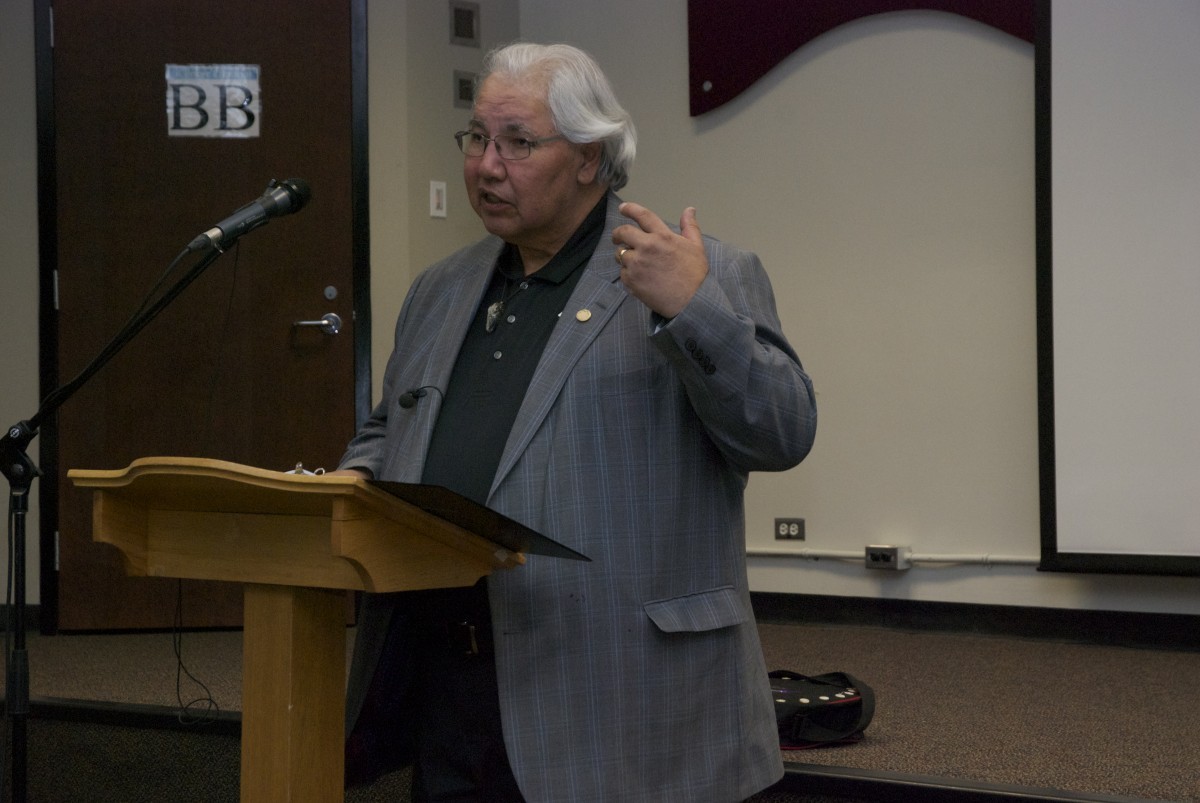
Justice and newly appointed Senator Murray Sinclair spoke about his early years as a student, saying he identified with the Ugly Duckling story.
Senator Justice Murray Sinclair discusses educators’ role in TRC
Teachers must help Indigenous students understand who they are, what they want to become, new Senator tells symposium responding to Calls-To-Action
Teachers must help Indigenous students understand their purpose in life and where they came from, Justice Murray Sinclair told those gathered at a symposium series responding to the Truth and Reconciliation Commission’s (TRC’s) Calls-to-Action.
Sinclair, who was also recently appointed to Senate, said institutions such as faculties of education must help educators learn “how to help Indigenous children in public schools understand that question.”
His presentation, held on March 22 in the Faculty of Education building, is part of the faculty’s symposium series taking place in 2016 responding to the TRC’s Calls-to-Action.
The purpose of the symposium series, said Melanie Janzen, associate dean, undergraduate, is to work with Sinclair, the National Centre for Truth and Reconciliation and with scholars across Canada. Its aim is “to help us figure out the TRC’s Calls-to-Action and to guide in our discussion in what the calls to action mean for education and for teacher education in Manitoba,” Janzen told those gathered to listen to Sinclair’s presentation.
“Justice Sinclair and fellow commissioners have made explicit in the calls to action what needs to be done. I believe it is our responsibility now to take up those calls and to make them a reality,” she added.
Ry Moran, the director of the National Centre for Truth and Reconciliation, said in his welcoming remarks that evening that Sinclair’s work in the TRC was monumental. “We have been brought through the vision, the wisdom, through the gentle guidance and the honourable words of Justice Sinclair to an inspired nation that is perhaps more ready than ever to embrace the Calls-for-Action.”
Sinclair noted that the TRC report spoke about the importance of education and the fact that education is the key to reconciliation, moving forward.
His presentation discussed ways to move ahead, including urging educators to help students answer four questions: where students come from, where they are going, why they are here and who they are.
“[That] is part of your responsibility to our children.”
Sinclair said that students thrive when they are able to understand their history, and that in turn will help the relationship they have with other people. It’s also important for children to understand what they want to become and for teachers to provide the skills, both in the classroom and outside the classroom, to get there.
“Where do I belong? What is the meaning of life?…Again as teachers, you are going to have to recognize when students are struggling with that question and help them understand it.”
As a young child growing up in Winnipeg’s North End, Sinclair told the audience that he enjoyed school and was an exceptional student and athlete, but that he felt like an outsider and experienced much racism. His favourite story growing up, he said, was The Ugly Duckling.
Upon graduation he went to university and studied education before dropping out to study law. He said that upon entering law school, he made a promise to his grandmother that he would use his education to help people. He has endeavoured to do that his whole life, he said.
“If I ever get to retire, I will probably volunteer as a Walmart greeter, just so I can say I helped somebody,” he joked.
He also noted that one of the most important things that teachers can do is to teach all students to be respectful of Indigenous culture and to ensure that the contributions made to Canada’s history by Indigenous people is passed on to students in the classroom.
“The last [residential] school closed in 1996. What that means is that for most of Canada’s existence [Canada] has treated Indigenous people with great abuse.”
Sinclair said one of his greatest motivations is life is to ensure that the truth about the strength and contributions of Indigenous people is taught in schools.
“I want you to teach children in your classes about us Indigenous people in this country in a way that engenders and shows respect.
“…If your one accomplishment in life is that you educated the children under your control to be respectful to Indigenous people…that’s more than anyone could ever ask.”






